May 17, 2021
A Kyiv mine worker rally protesting $71 million wage theft by state-owned coal-mining enterprises last week resulted in multiple concessions from the country’s Ministry of Energy. These included:
- Transferring more than $30 million on May 12 to state-owned coal mining companies’ accounts to pay back wages
- Directly paying back wages from the first three months of this year to non-industrial employees
- Committing to meeting regularly with the Independent Trade Union of Miners of Ukraine (NPGU) to strategize on the industry’s future
- Working with the Independent Trade Union of Miners of Ukraine (NPGU) to appropriately address low coal prices—including working toward a total ban on electricity and coal imports from Russia and Belarus, where oligarch control and failure to respect internationally accepted worker rights enables the low coal prices that are pushing Ukraine’s miners out of work.
“People who work in dangerous conditions, risk their lives every day and whose work depends on the country’s energy security must not be humiliated” said NPGU Chairperson Mykhailo Volynets during the rally.
The May 12 rally, which was located near Ukraine President Volodymyr Zelensky’s Kyiv office, brought together more than 500 mine workers from Donetsk, Luhansk, Lviv and Volyn. Protestors asserted Ukraine citizens’ constitutional right to renumeration for work performed, highlighted the difficult conditions for families of miners suffering wage theft and demanded postponement of labor-related draft laws that would eliminate labor and trade union rights. The rally follows on the heels on an 11-day protest last year over the same issues.
Energy Minister Herman Galushchenko said that, going forward, his ministry is committed to regular meetings with energy sector union leaders and miners to address long-term problems. “We are always open to dialogue and discussion of transformation concepts… But, for this, we need to work out mechanisms for constant normal communication,” he said.
In recognition of the Ministry of Energy’s concessions, NPGU suspended the protest. However, warned Volynets: “[T]he miners are ready to return with protests if the authorities, the government, the new Minister of Energy do not listen.”
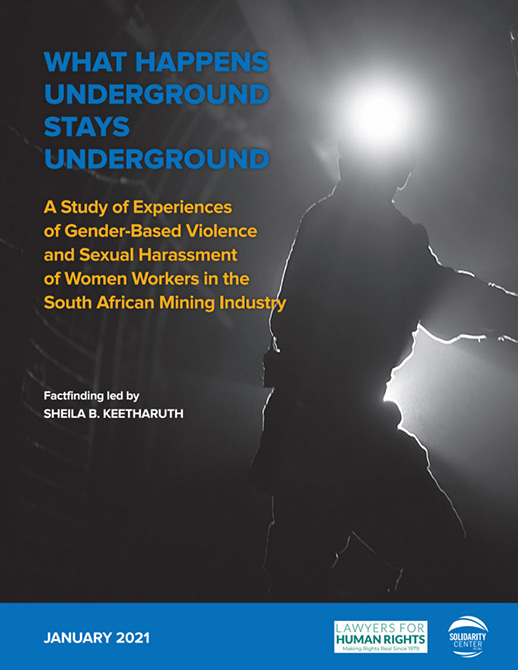
Apr 28, 2021
Women working in South African mines “at times confront danger, violence and indignity in their work environments,” where gender-based violence and harassment (GBVH) appears both widespread and normalized, according to a new report from the Solidarity Center and South Africa-based Lawyers for Human Rights (LHR).
The report, “What Happens Underground Stays Underground: A Study of Experiences of Gender-Based Violence and Sexual Harassment of Women Workers in the South African Mining Industry,” found that while verbal harassment is most common, women mineworkers also face requests for sexual favors in exchange for physical labor or for promotions, transfers or changes in work schedules. And sexual assault and harassment can occur both above and below ground at mines.
GBVH in the mining sector can be attributed to a range of complex political, social and economic factors, including:
- The dark and isolated nature of underground mines makes GBVH more likely, and monitoring and supervision of workers and evidence collection more difficult.
- South Africa’s dominant patriarchal social norms are exacerbating reporting barriers by enabling a culture of silence and victimization and the economic dependency of women on men.
- Women working within the numerically and culturally male-dominated sector are outnumbered and often subordinated in their personal security and professional development.
- Some business strategies are undermining the well-being of women workers in the mining industry, such as the outsourcing of female worker recruitment, which can expose recruits to sexual exploitation by gatekeepers of lucrative jobs, and the failure to accommodate women in the design and placement of facilities such as bathrooms, locker rooms, bus stops and elevators, which leaves women vulnerable to violence and harassment.
The report’s findings and recommendations are based on interviews conducted in Cape Town, Johannesburg, KwaZulu-Natal, Mpumalanga, Rustenburg and Wonderkop last year with former and current women mineworkers and representatives of women’s structures within mining unions, including the National Union of Mineworkers (NUM), the Center for Applied Legal Studies at Wits (CALS), the South African Gender Equality Commission, the South African Human Rights Commission and the Wits Mining Institute. All women mineworker interviewees chose to remain anonymous, to protect their safety and jobs.
“Women mineworkers, striving to support their families, live a troubling reality—one that comes at great cost to their physical and mental well-being. The stakes are high, and the failure to prevent GBVH amounts to granting tacit permission to perpetrators,” according to the report.
Lead report researcher Sheila B. Keetharuth—who previously served on the United Nations team of international experts on the Kasai, Democratic Republic of Congo—says that the lower proportion of female workers in the mining sector in South Africa is, “a recipe for disaster that necessitates easily accessible and trustworthy reporting mechanisms as provided for in the UN Guiding Principles on Business and Human Rights.”
The International Labor Organization two years ago adopted Convention 190, the first global binding treaty to address GBVH in the world of work. The treaty calls on governments, employers and unions to work together to confront the root causes of GBVH, including the multiple and intersecting forms of discrimination, gender stereotypes and unequal gender-based power relationships. South Africa has yet to ratify Convention 190.
“Safe and healthy jobs are among workers’ most fundamental rights,” says Solidarity Center Executive Director Shawna Bader-Blau. “As we observe World Day for Safety and Health at Work today, we must continue to reinforce that a safe workplace is one that is free of gender-based violence and harassment. And through unions, workers can achieve the strong, collective voice needed to improve safety and health on the job.”
Report recommendations include that:
- South Africa immediately ratify ILO C190 on Violence and Harassment at Work
- Occupational health and safety laws and policies, as well as sector-specific laws and policies, obligate employers to prevent and eliminate GBVH
- The country’s Mining Charter extend employer obligations with respect to prevention and elimination of GBVH and require that special measures be adopted for women working in mining
- In consultation with workers and unions, compulsory GBVH risk assessments be established for identifying safety risks.
- Acquisition of a mining license be conditioned on right holders’ commitment to the prevention and elimination of GBVH
- Employers adopt confidential and independent reporting system
- Women working underground be provided with a confidential, anonymous, efficient and easily accessible incident reporting system.
- Workers be informed that victims of sexual assault have the right to press separate criminal or civil charges against their perpetrators.
- Mandatory and effective education and training with respect to laws and policies on GBVH be provided to workers and supervisors, and that policies addressing GBVH be printed in all official languages, displayed conspicuously throughout the mining shafts, and widely and regularly promoted through interactive workshops.
- Policies against GBVH be included in employment contracts and clearly state repercussions for GBVH violations.
- The mining industry provide education and counseling to rehabilitate perpetrators in cases not likely to reach the level of criminal prosecution.
“Although the report shows that GBVH is rooted in complex and deeply entrenched patriarchal social norms, it also presents fairly simple, cost-effective changes to the work environment—such as improved lighting, a buddy system and safer toilet and locker room locations—that will make women mine workers less vulnerable to crimes of opportunity,” says Solidarity Center Rule of Law Department Senior Program Officer Ziona Tanzer.
Beginning in 2014, the Solidarity Center was a core member of a global coalition of worker rights organizations led by women union activists that successfully advocated for Convention 190. We support our partners as they campaign for their governments to ratify ILO Convention 190 and recognize GBVH as a primary barrier to achieving gender equality and a key step for security of all workers’ rights and seek to enhance the voice of women and other marginalized workers in policy making at the local, national, and international levels to reduce the risk of gender-based violence at work—including through their unions.
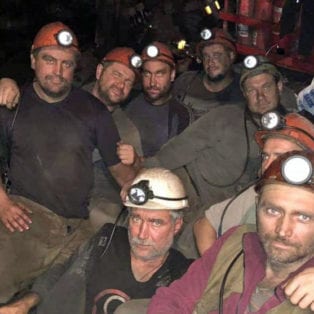
May 15, 2020
As the COVID-19 crisis deepens in Ukraine and scandals are alleged regarding state procurement of personal protective equipment (PPE), worker rights activists are leveraging trade unions’ collective power to advocate for better pay and conditions for working people and help provide emergency relief during quarantine. The country’s trade unions are persisting in delivering help and calling out injustices—no small task given that Ukraine last year was awarded the worst labor rights score in Central and Eastern Europe.
Worker-initiated advocacy measures include:
- Civil society activists and the five major trade unions of Ukraine that represent 7 million members continue to resist proposed changes to the country’s labor law, which, in violation of international labor law, would allow employers to fire workers for any reason and drastically reduce overtime pay.
- Ukraine’s construction workers’ union began a collective bargaining process to minimize the negative effects of the pandemic on the construction sector and initiated a criminal case against construction company Prosco for wage theft.
- Trade union activists are speaking out on behalf of an emerging small entrepreneurs’ movement that is protesting disproportionate government support for larger, mostly oligarchy-owned, businesses during the lock down, and demanding equal support for small and micro-businesses, including small-scale farms.
- Workers at Ukraine’s postal and delivery service Nova Poshta successfully lobbied their employer to provide all 30,000 Nova Poshta employees with PPE when needed and preserve the wages and benefits of those required to stop working during quarantine.
- The Federation of Trade Unions of Ukraine, FPU, on April 29 provided a live-streamed question-and-answer forum for labor leaders from Kharkiv, Kryvyi Rih, Poltava, Lviv, Zaporizzhya, Ternopil, and Kamyanske to consult with FPU experts about worker’s legal rights under Ukraine’s labor law during the pandemic, and to share their members’ most commonly reported violations—including overwork, employer pressure to take unpaid leave and issues around telework.
- Leaders of the Confederation of Free Trade Unions of Ukraine, KVPU, on April 30 held a live-streamed conference with representatives of the medical workers’ union, rail workers’ union, independent unions of Donetsk region, the LEONI Wiring Systems union and others to catalog and discuss challenges reported by workers at home and on the job due to the pandemic—including job losses at shuttered mines in the Donetsk region, lack of PPE for medical workers and the uneven impact of quarantine on women.
- Trade unions in the Dnipro region successfully lobbied employers, local government and volunteers for increased support of medical workers at the frontline of the COVID-19 fight.
- Tower crane operators in Lviv held a wildcat strike, refusing to work until they receive their February and March wages and employer-provided PPE.
- Following an appeal from workers at the Kremenchuk machine-building plant, the local government in Poltava province allocated an additional $14,600 for medical worker needs, including face masks.
Worker-initiated relief measures include:
- Labor Initiatives (LI), a Solidarity Center-supported Ukrainian non-profit organization, is providing legal assistance to workers by distributing COVID-related information through its phone hotline, website, Facebook page and other social media. LI’s hotline provided some 100 consultations during the country’s first week of quarantine; its website FAQ on labor rights during the quarantine was viewed more than 60,000 times in March.
- The Trade Union of Healthcare Workers of Ukraine (HWUU) launched a hotline to collect and respond to emergencies reported by frontline healthcare workers, which include inadequate PPE and excessive workloads due to layoffs.
- Trade union members at Nova Poshta launched a COVID-19 email help line, provided disinfectants and children’s educational materials to all its members, and distributed 1,000 face mask vouchers to members deemed most at risk from COVID-19.
- The trade union representing workers employed by the Naftogaz state energy enterprise collected $300,000 for local healthcare worker needs, which was distributed to workers at 21 hospitals and 26 urgent-care centers.
- Also to support medical workers, the trade union representing workers employed by Ukraine’s Rivne Department of Culture collected $2,000 while the Rivne province union solidarity fund donated $50,000.
- Members of the trade union representing workers at oil-transporting company Ukrtransnafta distributed 2,256 food baskets to elders in need at a cost of $31,500.
- Unions in Pavlograd purchased 20 medical ventilators for hospitals in Pavlograd, Pershotravensk and Ternivka, and purchased $112,000 of PPE.
- KVPU-affiliated trade union activists at Antonov aircraft company helped ensure the safety of workers who are transporting medical equipment and PPE globally, including to COVID-19 hotspots.
- The trade union representing nuclear sector workers in Ukraine donated its entire reserve fund of $38,500 toward the purchase of PPE and relief for medical workers.
- Nuclear sector workers in Mykolaiv province collected $7,300 for medical workers at Yuzhnoukrayinsk hospital.
- The local chapter of the industrial workers’ union in the city of Kryvyi Rih organized self-manufacture of face masks for its members and others, producing more than 1,000 masks through March.
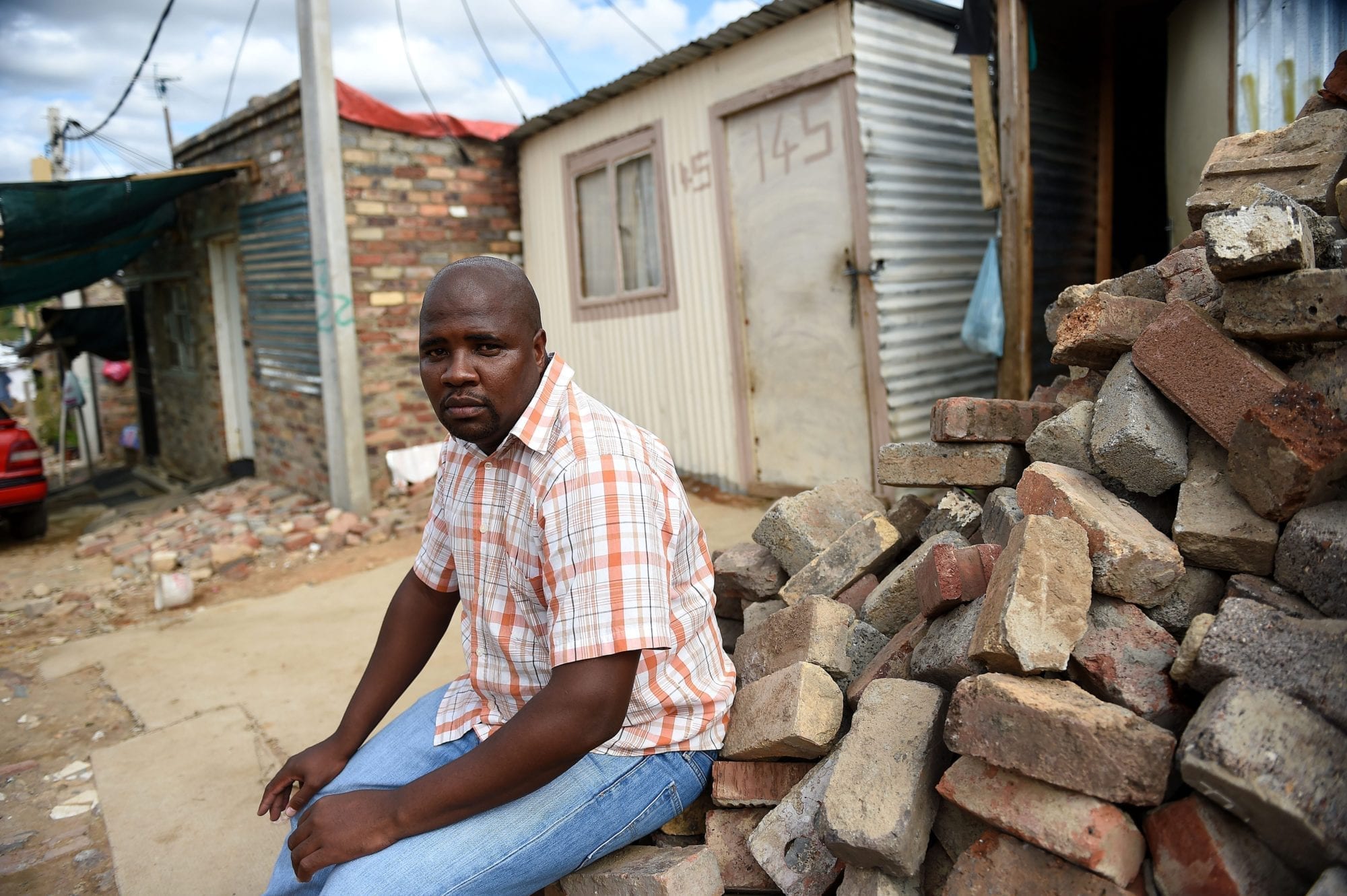
May 14, 2019
As a migrant mine worker from Swaziland, Mduduzi Thabethe says he has fewer workplace rights than his South African co-workers. Although all mine workers pay the same amount into the health fund, migrant workers get inferior care and pensions are rare.
“If you are a citizen of South Africa, you see you are building your country and you have something, but we have nothing.”
Although media and policymakers focus on African migrants to Europe, some 80 percent of African migrant workers remain on the continent.
Thabethe’s union, the Association of Mineworkers and Construction Union, is among those working to improve conditions for migrant workers.
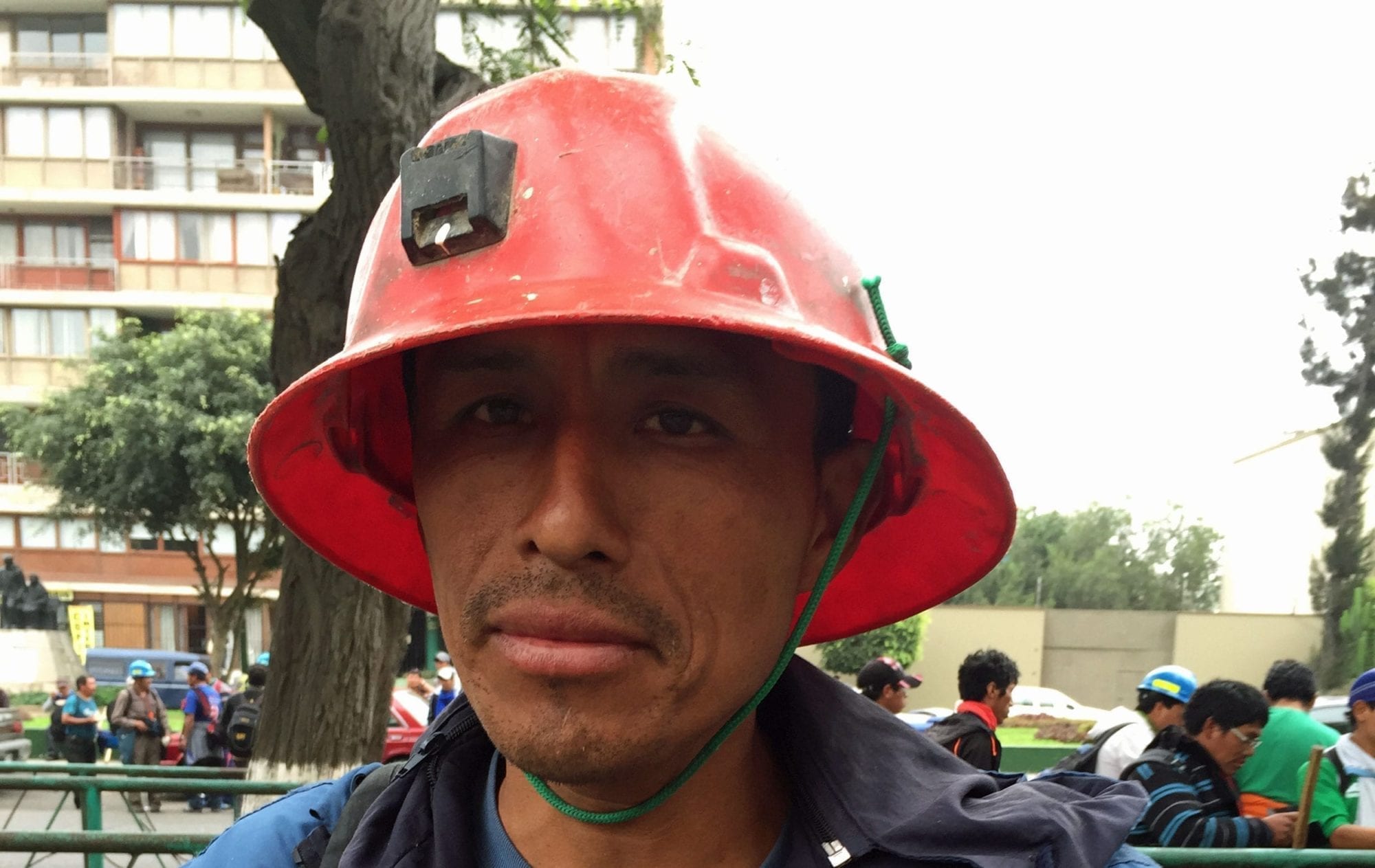
May 21, 2015
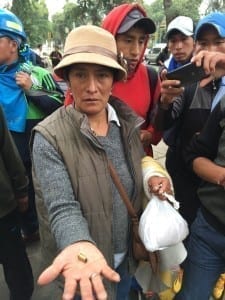
Bullet shells shot into a crowd of mineworkers at Peru’s Labor of Ministry.Credit:Solidarity Center/Samantha Tate
Six mineworkers were arrested and one injured from police gunfire yesterday as some 100 workers protested at the Ministry of Labor and Employment Promotion in Lima, Peru. The miners, who have been on strike for 17 days at Buenaventura’s Uchucchacua silver mine in the coastal region north of Lima, are calling for immediate improvement in safety and health conditions in the mines, especially air quality, which they say is extremely hazardous.
The mineworkers, all contract workers, gathered at the Labor Ministry, hoping their representatives could speak with Ministry representatives. After police accused them of blocking a public sidewalk, a police officer shot at the group, wounding mineworker Roberto Loyola, in the leg.
“We reject how we have been received here at the Ministry of Labor, with a worker wounded by a bullet,” says Uchucchacua Workers Secretary General Ronald Ventocilla. “We cannot allow Peruvians to be shooting at Peruvians. Buenaventura is an irresponsible employer that ignores its obligations to its workers, including high levels of carbon monoxide in the mines and not providing mineworkers with the food that they have committed to provide.”
On Tuesday, the Mineworkers Federation (FNTMMSP) launched a nationwide strike in part to call for a repeal of additions to Peru’s Health and Safety Law that make it more difficult for injured workers or their families to hold employers accountable for workplace injuries. Employers requested the amendments to the law, which was enacted last July.
Miners told Solidarity Center staff in Lima yesterday that when safety and health inspectors arrive at the mine to investigate working conditions, managers turn off the older machinery that produces the worst air contamination. Mineworkers regularly work 10-hour days underground for 14 days, followed by seven days off, and they say the continued exposure to toxic gasses prematurely ages them.
Contract workers at the mine, who are not in a union, earn $16 day, less than unionized Uchucchacua mineworkers, who are paid $22 a day, of which almost one third must be returned to the employer for food. Up to 30 workers who have participated in the strike have received letters from the employer saying they will be laid off for participating in the strike.
Buenaventura Group, owner of the Uchucchacua mine, is Peru’s largest producer of precious metals and in May announced $17.3 million dollars in net profit for the first quarter of 2015. The Uchucchacua mine, in the province of Oyon Lima region, produces about 714,300 pounds of silver a year. Peru is the world’s third-biggest silver producer.
Vowing to stay in Lima until Labor Ministry receives them—striking workers are sleeping under the eaves of the National Stadium because they don’t have the money to pay for a hotel—Ventocilla says, “Three days ago we started a ‘march of sacrifice’ to Lima and we are going to continue until the Ministry receives us.”
FNTMMSP decried the use of police violence to repress workers freedom of speech and is working with National Human Rights Coordinating Body to seek the release of the detained workers.





